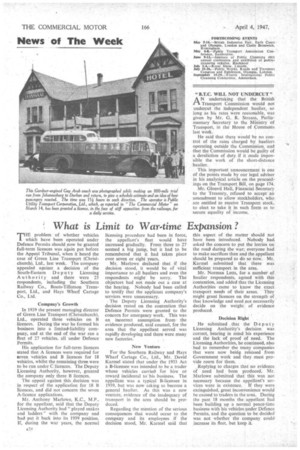What is Limit to Wartime Expansion ?
Page 26

If you've noticed an error in this article please click here to report it so we can fix it.
-rHE problem of whether vehicles 1 which have been operated under Defence Permits should now be granted full-term licences was again put before the Appeal Tribunal, when it heard the case of Green Line Transport (Christchurch), Ltd., last week. The company appealed against a decision of the South-Eastern Deputy Licensing Authority and there were 25 respondents, including the Southern Railway Co., Bouts-Tillotson Transport, Ltd., and Hays Wharf Cartage Co., Ltd.
Company's Growth In 1939 the present managing director of Green Line Transport (Christchurch), Ltd., operated three vehicles on B licences. During the war he formed his business into a limited-liability company, and at the end of the war ran a fleet of 27 vehicles, all under Defence Permits.
His application for full-term licences stated that A licences were required for seven vehicles and B licences for 18 vehicles, whilst the remaining three were to be run under C licences. The Deputy Licensing Authority, however, granted the company only three B licences.
The appeal against this decision was in respect of the application for 18 B licences, and did not concern the seven A-licence applications.
Mr. Anthony Marlowe, K.C., M.P., for the appellant, said that the Deputy Licensing Authority had " played snakes and ladders" with the company and had put it back into its 1939 position. If, during the war years, the normal licensing procedure had been in force, the appellant's fleet would have increased gradually. From three to 27 seemed a big jump, but it had to be remembered that it had taken place over seven or eight years.
Mr. Marlowe declared that if the decision stood, it would be of vital importance to all hauliers and even the respondents might be sorry. The objectors had not made out a case at the hearing. Nobody had been called to testify that the applicant company's services were unnecessary.
The Deputy Licensing Authority's decision rested on the contention that Defence Permits were granted to the concern for emergency work. This was an incorrect assumption from the evidence produced, said counsel, for the area that the appellant served was rapidly developing and there were many new factories.
New Venture
For the Southern Railway and Plays Wharf Cartage Co., Ltd., Mr. David Karmel stated that under the 1433 Act a B-licensee was intended to be a trader whose vehicles carried for hire or reward incidental tohis business. The appellant was a typical B-licensee in 1939, but was now asking to become a general haulier. As this was a new venture, evidence of the inadequacy of transport in the area should be produced.
Regarding the mention of the serious consequences that would occur to the company and its employees if the decision stood, Mr. Karmel said that this aspect of the matter should not have been introduced. Nobody had asked the concern to put the lorries on the road during the war; everyone had to make sacrifices then and the appellant should be prepared to do so now. Mr. Karmel submitted that there was sufficient transport in the area.
Mr. Norman Letts, for a number of haulier respondents, agreed with this contention, and added that the Licensing Authorities came to know the exact transport needs of their areas. They might grant licences on the strength of that knowledge and need hot necessarily decide on the weight of evidence produced.
Decision Right He submitted that the Deputy Licensing Authority's decision was correct, bearing in mind his experience and the lack of proof of need. The Licensing Authorities, he continued, also had to remember the many companies that were now being released from Government work and they must provide room for them.
Replying to charges that no evidence of need had been produced, Mr. Marlowe submitted that this was not necessary because the appellant's services were in existence. If they were extinguished, great inconvenience would he caused to traders in the area. During the past 18 months the , appellant had been building up a normal peace-time business with his vehicles tinder Defence Permits, and the question to be decided was not whether the company could increase its fleet, but keep it.












































































